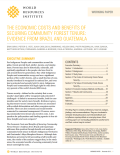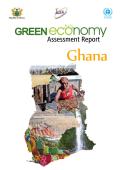This study explores how the proposed activities by the Congo Basin countries to reduce drivers of land emissions from deforestation and forest degradation (REDD+) could support the transition to a green economy and low carbon development future. By employing a content review and analysis of national REDD+ strategies and REDD+ readiness proposals submitted to the Forest Carbon Partnership Facility, the researchers found out that many of the proposed REDD+ activities by the Congo Basin countries including: climate smart agricultural practices and certification of large scale agricultural plantations; establishment of wood fuel energy plantations and improvement in energy efficiency; forests certification and implementation of the VPA-FLEGT; land use planning and zoning of mined sites; and the implementation of construction projects in low forested areas aligns with several green economy sectorial programmes of the Economic Community of Central African States (ECCAS).

Evidence is growing that tenure-secure community forests are associated with avoided deforestation and other ecosystem-service benefits. However, securing community forest tenure also involves costs, including costs to establish supportive legislation, to demarcate and register the lands, to monitor and protect the lands as well as opportunity costs. But what are the costs compared to the benefits of securing and maintaining community forest tenure for community forest areas?
This working paper adresses this question by undertaking a benefit-cost analyses of community forest tenure in Brazil’s Indigenous Territories and Guatemala’s Maya Biosphere Reserve. Although data limitations prevented a full accounting of all costs and benefits, the results of the analyses suggest that:
- in the study areas, the economic benefits of securing community forest tenure outweigh the costs;
- securing community forest tenure is a low-cost, high-benefit investment that benefits communities, countries, and global society;
- investing in strong community forest tenure security can be a cost-effective measure for climate-change mitigation.

